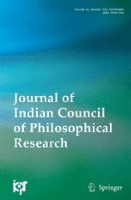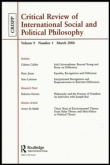
PHILOSOPHY & PUBLIC AFFAIRS
Scope & Guideline
Fostering Critical Insights for a Just Society
Introduction
Aims and Scopes
- Normative Political Philosophy:
The journal focuses on questions related to justice, rights, and political authority, often addressing contemporary issues such as democracy, equality, and social justice. - Ethics and Moral Philosophy:
It explores moral questions pertaining to individual and collective responsibilities, ethical consumerism, and moral dilemmas in various societal contexts. - Social and Cultural Critique:
The journal critically examines social norms, cultural practices, and the implications of identity and recognition in public life, often addressing issues of power dynamics and social justice. - Interdisciplinary Approaches:
Contributions often integrate insights from social sciences, political theory, and ethics, reflecting a commitment to a multifaceted understanding of public affairs. - Applied Philosophy:
It applies philosophical concepts to pressing public issues, such as climate change, technological ethics, and immigration, thereby bridging theoretical and practical realms.
Trending and Emerging
- Justice and Global Distributive Issues:
There is an increasing emphasis on global justice, particularly in relation to international distributive justice, reflecting growing concerns about inequality and resource distribution in a globalized world. - Social Recognition and Identity Politics:
Recent works emphasize the importance of social recognition, cultural appropriation, and the role of identity in public discourse, highlighting a trend towards understanding the nuances of social dynamics. - Political Equality and Voting Rights:
A significant focus on political equality, including epistemic constraints on voting and the role of civility in political disobedience, suggests a rising interest in the foundational aspects of democratic participation. - Ethics of Care and Responsibility:
Emerging discussions around duties of care, particularly in contexts such as reproductive ethics and refugee assistance, indicate a growing recognition of relational ethics and communal responsibilities. - Technological Ethics and Social Impact:
An increased number of papers addressing the ethical implications of technology, including algorithmic fairness and its social consequences, reflects a trend towards scrutinizing the intersection of technology and public policy.
Declining or Waning
- Algorithmic Fairness:
While previously a strong focus, discussions specifically centered on algorithmic fairness and its ethical implications have decreased, suggesting a potential shift towards broader discussions on technology and justice. - National Responsibility in Climate Change:
The theme of national responsibility in addressing climate change appears to have waned, possibly indicating a move towards more global or collective approaches rather than nation-centric discussions. - Egalitarianism:
Discussions specifically advocating for egalitarian principles have become less frequent, which may reflect a diversification of approaches to justice that move beyond traditional egalitarian frameworks. - Democratic Autonomy:
Themes directly addressing the concept of democratic autonomy have become less prevalent, indicating a potential shift towards practical implications of democracy rather than theoretical explorations. - Moral Progress and Virtue Signaling:
The focus on moral progress through virtue signaling has diminished, suggesting a transition to more substantive discussions on ethics and moral responsibility rather than critiques of social phenomena.
Similar Journals

Etica & Politica
Exploring the Nexus of Philosophy, Sociology, and Political ScienceEtica & Politica is a distinguished open access journal published by UNIV STUDI TRIESTE, EDIZIONI UNIVERSITA TRIESTE-EUT, focusing on the interconnected fields of philosophy, sociology, and political science. With an ISSN of 1825-5167, this journal has been a platform for scholarly dialogue and research dissemination since its inception in 1999, making it an essential resource for researchers, professionals, and students alike. Despite its current classification in the Q4 quartile for both Philosophy and Sociology/Political Science categories, Etica & Politica is committed to fostering interdisciplinary discussions that challenge prevailing paradigms and encourage innovative thought. Covering a converged time frame from 2013 to 2023, the journal offers an invaluable repository of insights and analyses that contribute to the academic discourse on ethics and politics, and strives to elevate its presence through rigorous peer review and scholarly contributions. Based in Italy, it continues to attract a diverse range of academic perspectives and invites contributors to engage in a vibrant intellectual community.

Ethics & International Affairs
Fostering Dialogue on Ethical Challenges WorldwideEthics & International Affairs is a leading peer-reviewed journal published by Cambridge University Press, offering critical insights at the intersection of ethics, philosophy, and international relations. Established in 1987 and reflecting a robust commitment to interdisciplinary scholarship, the journal aims to foster dialogue on pressing ethical issues in global affairs, addressing topics from military intervention to humanitarian aid. With an impressive Scopus ranking that places it in the 85th percentile for Philosophy and the 64th percentile for Political Science and International Relations, Ethics & International Affairs has established itself as a cornerstone publication within academic circles. Although the journal is not Open Access, it remains accessible through academic institutions and libraries. The journal provides a platform for researchers, professionals, and students alike to contribute to and engage with the evolving discourse on ethical challenges in international contexts, making it an essential resource for anyone looking to deepen their understanding of the moral dimensions of global politics.

Sophia
Cultivating Knowledge at the Intersection of Thought and TraditionSophia, a prestigious journal published by Springer, is a leading platform for the advancement of knowledge in the fields of Philosophy and Religious Studies. Established in 1962, this open-access journal has embraced a global perspective and invites scholarly contributions that explore complex philosophical questions and the intricacies of religious thought. With an impact factor that reflects its significance, Sophia ranks in the top quartiles of its categories on Scopus, specifically Q2 in Philosophy and Q1 in Religious Studies, showcasing its influence and reach within the academic community. With convenient open access options available since 2009, the journal ensures that research disseminates freely, promoting engagement among researchers, professionals, and students alike. Located in the Netherlands and connected to a reputable international network, Sophia remains committed to fostering intellectual dialogue and enriching the discourse surrounding philosophical and religious issues worldwide.

AUSTRALASIAN JOURNAL OF PHILOSOPHY
Fostering Rigorous Debate in PhilosophyAustralasian Journal of Philosophy, published by Routledge Journals, Taylor & Francis Ltd, serves as a premier platform for scholarly discourse in the field of Philosophy. With its origins dating back to 1947, this esteemed journal maintains a rich tradition of fostering high-quality, peer-reviewed research and is recognized for its significant contribution to the philosophy community. Holding a distinguished Q1 ranking in the field for 2023 and standing at #75 out of 806 in the Scopus Arts and Humanities ranking, it occupies a vital niche in advancing philosophical knowledge and inquiry. Although the journal is not open access, it periodically offers articles that contribute to the dissemination of philosophical thought, making it a valuable resource for researchers, professionals, and students alike. The AUSTRALASIAN JOURNAL OF PHILOSOPHY continues to inspire and challenge thinkers worldwide as it presents critical analyses, innovative ideas, and rigorous arguments, ensuring its relevance and importance in contemporary philosophical discussions.

Ethical Theory and Moral Practice
Cultivating Critical Perspectives on Ethical IssuesEthical Theory and Moral Practice is a distinguished academic journal published by SPRINGER, focusing on the intricate intersections of ethics, morality, and social philosophy. With an ISSN of 1386-2820 and E-ISSN 1572-8447, it has been a vital platform for scholarly discourse since its inception in 1999, converging its publication years from 1999 to 2002 and then from 2004 to 2024. The journal holds an impressive standing in the academic community, reflected by its Q1 ranking in Philosophy and Q2 in Social Sciences (miscellaneous) for 2023, as well as its notable Scopus rankings in both Arts and Humanities and Social Sciences. Despite being a subscription-based journal, it plays a crucial role in shaping contemporary ethical discussions and provides researchers, professionals, and students with insightful analysis and innovative approaches to moral issues facing society today. Its commitment to advancing understanding in these essential fields underscores its significance as a leading resource for scholars dedicated to exploring moral practice and ethical theory.

AMERICAN PHILOSOPHICAL QUARTERLY
Advancing Thought Through Rigorous DiscourseAMERICAN PHILOSOPHICAL QUARTERLY, published by University of Illinois Press, stands as a premier venue for scholarly discourse in philosophy, boasting an impressive Q1 ranking in its field and positioning itself within the top 19% of its category according to Scopus. With a long-standing history since its inception in 1973, the journal has become influential in shaping contemporary philosophical thought and debate. As a non-open access publication, it provides rigorous peer-reviewed articles that cover a wide range of philosophical topics, catering to the needs of researchers, professionals, and students alike. The journal’s commitment to intellectual excellence and critical inquiry makes it an essential resource for anyone seeking to engage deeply with philosophical issues today.

LAW AND PHILOSOPHY
Bridging the Gap between Legal Norms and Philosophical IdeasLaw and Philosophy is a distinguished academic journal published by Springer, focusing on the intersection of legal studies and philosophical inquiry. With an esteemed impact factor reflecting its influence in the field, the journal has achieved notable ranks, placing it in Q2 in Law and Q1 in Philosophy as of 2023. Readers can access it through institutional subscriptions, emphasizing its role in enriching debates around law's philosophical underpinnings. This journal, with its inception in 1982 and continuing through 2024, provides a platform for innovative ideas, fostering dialogue among researchers, professionals, and students. It aims to publish cutting-edge articles that challenge existing doctrines and propose new theoretical frameworks, making it essential for anyone engaged in the critical study of law and its philosophical ramifications.

Journal of Indian Council of Philosophical Research
Nurturing a vibrant academic environment for philosophical exploration.The Journal of Indian Council of Philosophical Research, published by SPRINGER INDIA, serves as a vital platform for scholarly discourse in the realm of philosophy. With an ISSN of 0970-7794 and an E-ISSN of 2363-9962, this journal is committed to advancing philosophical inquiry and engaging with contemporary philosophical debates. Although it is currently categorized in the Q4 quartile for Philosophy and retains a position in the 28th percentile within its Scopus category rankings, the journal aims to uplift philosophical dialogue and promote innovative ideas through exclusive articles, reviews, and critical essays. Based in New Delhi, India, the journal operates within a vibrant academic context and spans converged years from 2015 to 2024. While it is not an open-access journal, it offers essential insights and perspectives that contribute significantly to the field of philosophy. Scholars and students alike will find this journal an invaluable resource for enriching their understanding and fostering intellectual growth in philosophical research.

Journal of Social Philosophy
Unraveling Complexities of Social EthicsJournal of Social Philosophy, published by Wiley, is a premier academic resource in the field of philosophy, specifically focused on social theory and ethics. With an esteemed impact factor indicative of its scholarly influence, this journal consistently ranks in the Q1 category of philosophy journals, placing it among the top 12% of publications in its field according to Scopus. Spanning a convergence of intellectual inquiry since its establishment in 1970, the journal serves as a vital platform for researchers, professionals, and students to engage with groundbreaking discussions and contemporary debates relevant to social philosophy. Although it does not offer an open-access model, the journal is accessible through various academic institutions globally, ensuring that its rich content reaches an informed audience eager for rigorous philosophical exploration. With headquarters located in the United Kingdom, the Journal of Social Philosophy continues to shape the discourse on social practices, ethics, and political theory well into 2024 and beyond.

Critical Review of International Social and Political Philosophy
Navigating the Complexities of Modern Sociopolitical LandscapesThe Critical Review of International Social and Political Philosophy, published by ROUTLEDGE JOURNALS, TAYLOR & FRANCIS LTD, stands as a pivotal platform in the realms of philosophy, sociology, and political science. With an impressive Q1 ranking in Philosophy and a Q2 ranking in the Social Sciences sector for 2023, the journal is uniquely positioned to explore and critique contemporary issues through a philosophical lens. Although it does not currently offer Open Access, its esteemed reputation is evident in its Scopus rankings: 136th in Arts and Humanities and 610th in Social Sciences, reflecting its substantial impact in these fields. Covering a broad spectrum of topics, the journal invites contributions that delve into theoretical explorations and empirical studies, aiming to foster critical discussions that resonate in today’s sociopolitical landscape. Published in the United Kingdom, the journal continues to serve as an essential resource for researchers, professionals, and students seeking to deepen their understanding of social and political thought.